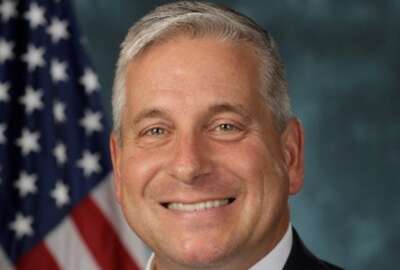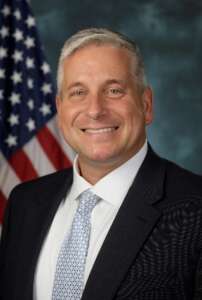 Exclusive
Exclusive  Exclusive
Exclusive Paul Courtney, the chief procurement officer at the Homeland Security Department, said he didn’t consider opening up the multiple-award IT products and software...
The Department of Homeland Security is inching closer to make awards under its much-anticipated FirstSource III small business IT products and software contract.
While the timeline is still a bit fluid, the goal is to finally get this almost two-year effort completed in 2023.
Paul Courtney, the chief procurement officer at the Department of Homeland Security, said there are several reasons why awards under FirstSource III have taken so long, including the more than 600 proposals his office received and is reviewing.

“With that volume, conducting meaningful evaluations of the proposals did take did take a considerable amount of time. We did have some protests, and they have been resolved, but that did slow things down a little bit,” Courtney said in an exclusive interview with Federal News Network. “We believe due process is very important, so if a vendor feels like they need to raise their hand and file protests, we understand it’s just doing business, and we make sure we resolve those the appropriate way.”
DHS issued the solicitation to this multiple award small business contract, which has a $10 billion ceiling, in April 2021. Over the last almost two years, DHS issued 15 amendments, and pushed back the final phase 2 proposals due date eight times between August 2022 and January 2023.
Courtney, who became DHS CPO in August 2022, said his team understands the frustration in industry for how long it has taken to get to award, and DHS wants to move on with the contract too.
“We’ve received valuable feedback and we’re gathering lessons learned. One of the feedback we got for FirstSource II that we applied to FirstSource III is there was way too much administrative burden on the contract administration side of thing. We’ve taken that to heart, and we’ve made these revisions with FirstSource III to help reduce that administrative burden once the award is made,” he said. “As we continue through the evaluation process, we encourage vendors to look at SAM.gov for current timelines and updates. If it feels like there’s a void in time, industry is very quick to reach out. We have a DHS industry liaison mailbox and you can reach out to the contracting officer. Our whole team is ready to award this and move forward and just want to make sure we do it right and make sure we have a great pool of vendors at the end of the day supporting our FirstSource III contracts.”
Courtney said DHS did not consider opening up FirstSource III to more awardees, including taking the approach of letting all those who were minimally qualified on the contract.
Other agencies such as the Air Force and the Navy have taken that approach with vehicles like NetCents and SeaPort-e as a way to avoid the prolonged award-protest-award cycle.
Courtney said that while that may reduce the risk of protest, that approach wasn’t right for DHS.
“We want to make sure we get the most highly-competitive, highly-qualified firms under the contract. Therefore, there’s going to be a premium placed on the effort that goes into getting the best of the best on FirstSource III,” he said. “We’re not going to let everybody in as we’re more on the side of getting the best of the best depending on what we’re trying to buy and really still have that competition at the beginning. We’ve got to look at price at the indefinite delivery, indefinite quantity (IDIQ) blanket purchase agreement (BPA) level the way the rules are written today. If we didn’t have to do that, then maybe we wouldn’t look at price initially, but we are required to do that. Once the BPA or the IDIQ is awarded, we have a great group of companies. Again, to be fair to them, we don’t think it’s wise to have 300 companies going after every task order. That’s just the way we’ve done things in the department.”
Courtney said he’d like to have the same authority that the General Services Administration has under Section 876 where they don’t have to look at price at the master contract level. But until Congress grants DHS that ability, he said price remains an important evaluation factor.
One way DHS is trying to reduce the perception that FirstSource III is a “one and done” type of vehicle, meaning if a vendor doesn’t win an award, they are cut off from DHS opportunities for the next decade, is through on-ramps.
“If we put together a five, six, seven year contract, industry is going to change. There’ll be new vendors in the marketplace, who we want to have. So that’s something we are looking at and we are putting in place with our bigger vehicles,” he said. “But with that, on the flip side, we’re also going to have off ramping so if we have a vehicle with 50 companies and only five or 10 are really going for every opportunity, and a majority of them, another 30-40 companies that aren’t, we’ll have this conversation with those companies, whether it makes sense for them to stay on the vehicle. Maybe we start off ramping if a company has done something and X period of time?”
Courtney added the specifics around on- and off-ramping are not final yet, but it’s an important feature to incorporate into FirstSource III going forward.
In addition to FirstSource III, DHS also is developing the third version of the PACTS — Program management, Administrative, operations (Clerical) and Technical Services — vehicle. The $1.5 billion multiple award contract is for non-IT services and DHS is expanding it to target small, veteran-owned service-disabled businesses as well as women-owned, HUBZone, and 8(a) businesses, Courtney announced in an industry notice on Feb. 13.
DHS has scheduled an industry day for March 16, according to a notice published in January. Additionally, DHS says the final solicitation is now due out by Aug. 30 instead of June 30 with an award estimated to come in fourth quarter of fiscal 2024.
Finally, Courtney said DHS will continue with its plan around Eagle Next Generation, which is using existing governmentwide acquisition contracts from GSA, NASA and the National Institutes of Health instead of moving out with its own contract vehicle.
“We’re watching all those and working closely with GSA, NIH and all these vehicles,” he said. “Industry is curious to know what DHS will adopt and maybe not adopt. The whole idea is to make sure we have the vehicles in place for our staff to be successful, and it has to be the right vehicles, there’s some GWACs that we don’t adopt, some best-in-class vehicles we don’t adopt because it just doesn’t make sense for our workforce.”
Copyright © 2025 Federal News Network. All rights reserved. This website is not intended for users located within the European Economic Area.
Jason Miller is executive editor of Federal News Network and directs news coverage on the people, policy and programs of the federal government.
Follow @jmillerWFED
 Exclusive
Exclusive 

